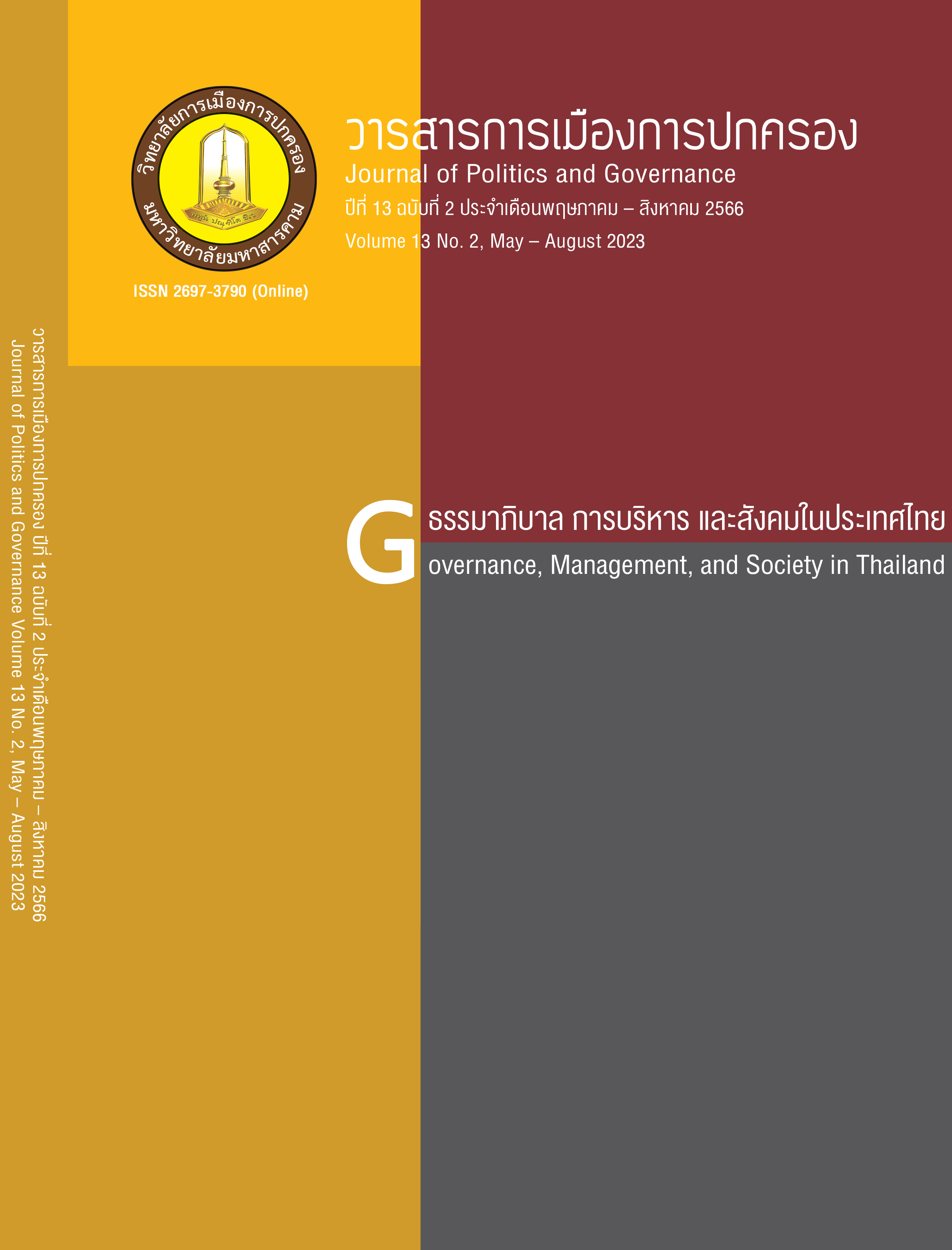Strengthening Motivation for the Litigant Bring the Case into the Sustained of Dispute Settlement Process : Study of the Dispute Conciliation Center of Maha Sarakham Provincial Legal Execution Office
Main Article Content
Abstract
The legal execution department provides for mediation at the legal execution stage. And can mediate successfully in more than 90 percent of the mediation case. But it appears that less than 5% of the parties brought the case into the mediation process of the total number of cases.
The objective of this research was to developing motivation for enable the parties to bring their cases to the mediation process in the legal execution floor and to find a management approach strengthening motivation for enable the parties to bring their cases to a sustainable mediation process in the legal execution floor.
The study found that thailand does not have any laws that provide incentives for mediating disputes in the legal execution floor. Because of the mediating disputes in the legal execution floor of thailand at present, there is no direct law.
Motivation that lead the parties to bring their cases to a mediation process in the legal execution floor such as:
(1) The parties want to settle the dispute in the legal execution floor. The mediation of the dispute will save time and money for the parties.
(2) The parties want to maintain a relationship with each other. So that both parties can continue to transact in the future.
(3) The parties saw the benefits of mediation. If the mediation is successful, it will benefit more than the case of allowing further execution.
(4) The parties are of the opinion that mediation will bring justice to both parties. Because the terms of payment due to the fact that both parties agreed among themselves. until satisfactory to both parties.
Article Details
References
ชลธร มีวงศ์อุโฆษ. (2556). เวทีไกล่เกลี่ย/สมานฉันท์: ปัจจัยที่ทำให้การไกล่เกลี่ยชั้นบังคับคดีไม่ประสบ
ความสำเร็จ. วารสารกรมบังคับคดี, 17(86).
ชลธิดา เพิ่มทรัพย์. (2555). ปัจจัยที่มีความสัมพันธ์ต่อความสำเร็จในการไกล่เกลี่ยคดีฟ้องหย่า. ดุลพาห, 59(2), 82-93.
ชลัท ประเทืองรัตนา. (2558). บทวิจารณ์หนังสือ Intractable Conflicts: Socio-Psychological Foundation and Dynamics. วารสารสถาบันพระปกเกล้า, 13(3), 55.
ชลัท ประเทืองรัตนา. (2559). การไกล่เกลี่ยโดยคนกลางเส้นทางแห่งการสร้างความเข้าใจร่วมกัน. กรุงเทพฯ: สถาบันพระปกเกล้า.
ชลาภรณ์ เจริญรัตน์. (2558). ปัจจัยที่มีผลต่อความสำเร็จในการไกล่เกลี่ยข้อพิพาทชั้นบังคับคดี: กรณีศึกษาศูนย์ไกล่เกลี่ยข้อพิพาท กรมบังคับคดี. (สารนิพนธ์ศิลปศาสตรมหาบัณฑิตไม่ได้ตีพิมพ์). มหาวิทยาลัยธรรมศาสตร์, กรุงเทพฯ.
โชติช่วง ทัพวงศ์. (2548). การจัดการความขัดแย้งกับการไกล่เกลี่ยข้อพิพาท. กรุงเทพฯ: สำนักระงับข้อพิพาทสำนักงานศาลยุติธรรม.
นวลจันทร์ ทศนชัยกุล. (2547). รายงานวิจัยเรื่องศาลยุติธรรมกับการระงับข้อพิพาท. ภาควิชารัฐศาสตร์และรัฐประศาสนศาสตร์ (ภาคพิเศษ) มหาวิทยาลัยเกษตรศาสตร์, กรุงเทพฯ.
บรรจง วิทยถาวรวงศ์, และอิทธิกร ขําเดช. (2554). ปัจจัยที่มีผลต่อแรงจูงใจในการแยกขยะครัวเรือนของประชากร ในเขตกรุงเทพมหานคร. วารสารการเงิน การลงทุน การตลาด และการบริหารธุรกิจ, 1(2). 85-111.
ปัทมา เผ่าสังข์ทอง. (2544). การแก้ไขปัญหาความขัดแย้งในคดีครอบครัว:ศึกษากระบวนการไกล่เกลี่ยกรณีหย่า. (วิทยานิพนธ์นิติศาสตรมหาบัณฑิตไม่ได้ตีพิมพ์). มหาลัยธรรมศาสตร์, กรุงเทพฯ.
ปราโมทย์ วรวัฒนชัย. (2545). การไกล่เกลี่ย : ศึกษากรณีศาลทรัพย์สินทางปัญญาและการค้าระหว่างประเทศกลาง. (วิทยานิพนธ์นิติศาสตรมหาบัณฑิตไม่ได้ตีพิมพ์). มหาวิทยาลัยรามคำแหง, กรุงเทพฯ.
ป้อมฤดี กุมพันธ์. (2557). การไกล่เกลี่ยข้อพิพาทก่อนฟ้องในศาลส่วนคดีนักท่องเที่ยว. (วิทยานิพนธ์นิติศาสตรมหาบัณฑิตไม่ได้ตีพิมพ์). สถาบันบัณฑิตพัฒนบริหารศาสตร์, กรุงเทพฯ.
พรทิพย์ อุดมสิน (2546). การไกล่เกลี่ยข้อพิพาทในศาลกับการช่วยลดภาระการบริหารจัดการคดี. นนทบุรี: มหาวิทยาลัยสุโขทัยธรรมาธิราช.
พิชัยศักดิ์ หรยางกูร. (2540). ภาษิตกฎหมาย ลาติน-ไทย. กรุงเทพฯ: สามย่านวิทยพัฒนา.
ภานุ สหัสรังสี. (2548). รวมบทความการไกล่เกลี่ยและประนอมข้อพิพาทและความรู้เบื่องต้นเกี่ยวกับกฎหมายที่เกี่ยวข้อง. กรุงเทพฯ: สำนักงานระงับข้อพิพาท สำนักงานศาลยุติธรรม.
โยธิน ศันสนยุทธ. (2530). ทฤษฎีความต้องการของเมอร์เรย์, มนุษยสัมพันธ์: จิตวิทยาการทำงานในองค์การ (พิมพ์ครั้งที่ 2). กรุงเทพฯ : ศูนย์ส่งเสริมวิชาการ.
โยธิน ศันสนยุทธ. (2530). มนุษยสัมพันธ์. กรุงเทพฯ: จุฬาลงกรณ์มหาวิทยาลัย
โยธิน ศันสนยุทธ. (2530). แรงจูงใจในการซื้อ. กรุงเทพฯ: รุ่งเรืองสาส์นการพิมพ์.
ราชบัณฑิตยสถาน. (2556). พจนานุกรมฉบับราชบัณฑิตยสถาน พ.ศ. 2554. กรุงเทพฯ: นานมีบุ๊คส์พับลิเคชั่นส์.
วนิดา พรมหล้า, ศักดิ์ชาย สุนทรธนาภิรมย์, และธวัชชัย ป้องศรี. (2560). การสร้างแรงจูงใจในการบริหารจัดการขยะอย่างยั่งยืนในประเทศไทย. รายงานการวิจัย. มหาวิทยาลัยมหาสารคาม.
วรรณภร ลิ้มเฉลิมฉัตร. (2561). การสร้างแรงจูงใจในการไกล่เกลี่ยข้อพิพาทก่อนฟ้องส่วนคดีแพ่งในศาลจังหวัดปทุมธานี.
วันชัย วัฒนศัพท, บรรพต ตันธีรวงศ์, และศุภณัฐ เพิ่มพูนวิวัฒน . (2549). การจัดการความขัดแย้งในระบบบริการสาธารณสุข: หลักการแนวปฏิบัติและนโยบายศูนย์สันติวิธีสาธารณสุข. กรุงเทพฯ.
วันชัย วัฒนศัพท์. (2550). ความขัดแย้ง หลักการและเครื่องมือแก้ปัญหา (พิมพ์ครั้งที่ 3). ขอนแก่น: ศิริภัณฑ์ออฟเซ็ท.
วิชา มหาคุณ. (2537). ความรู้ทั่วไปในการไกล่เกลี่ยข้อพิพาทและประนีประนอมคดีครอบครัว. ดุลพาห, 41(6). 41.
ศักดิ์ชาย สุนทรธนาภิรมย์. (2561) บทบาทของศูนย์ดำรงธรรมในการระงับข้อพิพาทในชุมชน: ศึกษาศูนย์ดำรงธรรมจังหวัดมหาสารคาม. วารสารการเมืองการปกครอง, 9(1), 154.
สรวิศ ลิมปรังษี. (2550). การไกล่เกลี่ยข้อพิพาทของศาลในประเทศอังกฤษ. ศาลยุติธรรมปริทัศน์, 1(3).
สุภัทรา กรอุไร. (2543). การประนอมข้อพิพาททางอาญา. (วิทยานิพนธ์นิติศาสตรมหาบัณฑิต). มหาวิทยาลัยธรรมศาสตร์.
สุรเชษฐ์ เณรบำรุง. (2552). ปัญหาการไกล่เกลี่ยข้อพิพาทในคดีผู้บริโภค : ศึกษาเฉพาะกรณีการไกล่เกลี่ยในชั้นของคณะกรรมการคุ้มครองผู้บริโภค. (วิทยานิพน์หลักสูตรนิติศาสตรมหาบัณฑิตไม่ได้ตีพิมพ์). มหาวิทยาลัยธุรกิจบัณฑิต, กรุงเทพฯ.
สุรศักดิ์ ศรีสาร. (2559). การพัฒนารูปแบบการไกล่เกลี่ยระงับข้อพิพาทโดยชุมชนอย่างมีสมานฉันท์. (วิทยานิพน์ปริญญาปรัชญาดุษฎีบัณฑิต). มหาวิทยาลัยศิลปากร, กรุงเทพฯ.
สำนักงานศาลยุติธรรม. (2552). คู่มือการระงับข้อพิพาทสำหรับประชาชน. กรุงเทพฯ: จิรรัชการพิมพ์.
สำนักระงับข้อพิพาทสำนักงานศาลยุติธรม. (2550). การจัดการความขดแย้งกับการไกล่เกลี่ยข้อพิพาท. กรุงเพทฯ: ธนาเพรส จํากัด.
สำนักงานคณะกรรมการพัฒนาการเศรษฐกิจและสังคมแห่งชาติ. (2547). 72 พรรษามหาราชินี/ธนาคารสมอง
สำนักงานคณะกรรมการพัฒนาการเศรษฐกิจและสังคมแห่งชาติ. กรุงเทพฯ: สำนักงานคณะกรรมการพัฒนาการเศรษฐกิจและสังคมแห่งชาติ.
Domjan, M. (1996). The Principles of Learning and Behavior Belmont. California: Thomson Wadsworth.
Engel, David M. (1978). Code and Custom in a Thai Provincial Court : The Interaction of Formal and Informal Systems of Justice. Tucson: Universithy of Arizona Pess, for The Association for Asian Studies.
Guilford, J.P. (1965). Fundamental statistics in Psychology and Education. New York : Mc Graw-Hill, Inc,. (Doctoral dissertation, University of Michigan, 1968).
Hanson, Mark E. (1996). Educational Administration and Organizational Behavior (4th ed.). Boston : Allyn and Bacon.
John William Atkinsion, Norman T. Feather. (1966). Achievement Motive, A theory of achievement motivation, 6, Publisher Wiley.
Kidd, J. R. (1973). How Adults Learn. New York: Association Press.
Lovell, R.Bernard. (1980). Adult learning. London: Croom Helm.
Murray, H. A. (1983). Exploration in Psychlogy A Clinical and Experimental Study of Fifty Men of College Age. New York: Oxford University Press.
Oran R. Young. (1967). The Intermediaries: Third Parties in International Crises. Princeton: Princeton University Press, 427, Viii.


